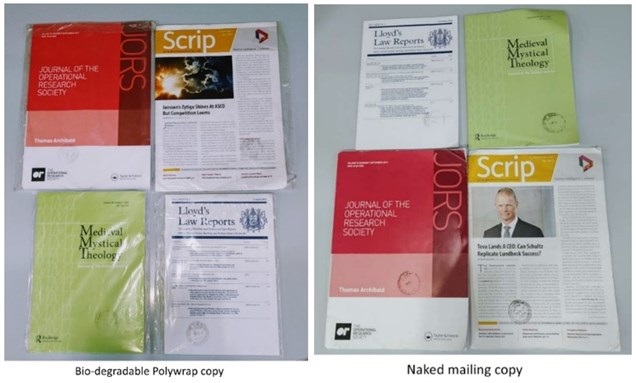Taylor & Francis leading the way in reducing plastic

Taylor & Francis is pleased to announce the success of our year-long Alternative Mailing Packaging (AMP) trial. We have successfully moved over 900, one third, of our research journal titles to no lamination and what we in the industry call a “naked” mailing. In the past it had been the norm to use lamination to protect journals and allow them to withstand frequent use; however we decided that it was worth changing old habits for the environment’s sake, and have offered to replace any damaged copies free of charge for our customers. Additionally our paper and cover board are FSC accredited meaning the pulp is only sourced from sustainable forests. Removing the lamination from as many journals as possible will ensure our journals are fully recyclable and sustainable.
According to a customer survey 99 out of 117 gave the appearance of the non-laminated journals an 8 or above (86 gave 10); and 103 out of 117 said they would find it acceptable to receive future copies in this manner.
Stewart Gardiner, Journals Global Production Director, has led this initiative, “According to The Ocean Conservancy, 8 million metric tons of plastics enter the ocean every year, turning into microplastics which have a significant negative impact on the health of living beings, both on land and at sea. Taylor & Francis is excited to lead the publishing field and influence others to help reduce unnecessary plastic. By the end of 2020, we aim to reduce our use of plastic wrap and lamination globally by 50%; in 2021, by 90%; and in 2022, by 100%.”
Taylor & Francis’ print and dispatch suppliers have been instrumental in helping to successfully trial this initiative, including purchasing new equipment and reworking automated workflows. The main suppliers involved are Henry Ling, CPI and Air Business in the UK, Markono in Singapore and Sheridan and The Mail Group in the US. Once Taylor & Francis completes moving as many journals as possible to a plastic free workflow we will begin to look at getting rid of the plastic shrink wrap used to move paper, journals and other palleted materials between suppliers.
This plastic free initiative follows directly on the heels of our signing the Sustainable Development Goals Publishers Compact, a pledge which features 10 action points to accelerate progress towards the Sustainable Development Goals (SDGs) by 2030. It affirms our ongoing commitment to sustainable practices and to champion the SDGs during this UN Decade of Action (2020-2030).